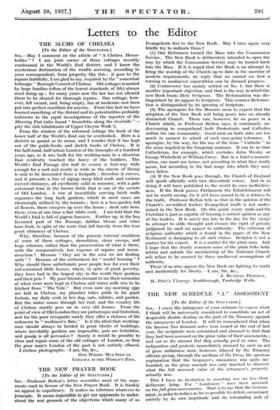THE NEW PRAYER BOOK
[To the Editor of the SPECTATOR.] Sin,—Professor Relton's letter resembles most of the argu- ments used in favour of the New Prayer Book. It is frankly an appeal to expediency. It makes no reference whatever to principle. It seems impossible to get our opponents to under- stand the real grounds of the objections which many of us
Evangelicals feel to the New Book. May I once again very briefly try to indicate them ?
(1) Our Reformers turned the Mass into the Communion Service. The New Book is deliberately intended to open the way by which the Communion Service may be turned back into the Mass. If it is urged that the Book is an attempt to bring the worship of the Church up to date in the meeting of modern requirements, we reply that we cannot see how a turning to mediaeval superstition can be deemed progress.
(2) Controversy has mainly settled on No. 1, but there is another important objection, and that is the way in which the new Book treats Holy Scripture. The Reformation was dis- tinguished by its appeal to Scripture. This counter-Reforma- tion is distinguished by its ignoring of Scripture.
(3) The apologists for the Measure seem to expect that the adoption of the New Book will bring peace into an already distracted Church. There can, however, be no peace in a Church which, as Professor Belton says, is continually en- deavouring to comprehend both Protestants and Catholics within the one community. Good men on both sides are too much in earnest to admit of such easy-going tolerance. I apologize, by the way, for the use of the term " Catholic " in the sense implied in the foregoing sentence. It can be no true Catholicism, for example, which excludes John Wesley or George Whitefield or William Carey. But in a brief communi- cation, one must use terms, not according to what they really mean, but according to the bad usage into which they may have fallen.
(4) If the New Book goes through, the Church of England will speak officially with two discordant voices. And in so doing it will have published to the world its own ineffective- ness. If the Book passes Parliament the Establishment will not be worth saving, for it will have ceased to be a witness to the truth. Professor Relton tells us that in the opinion of the Church's accredited leaders Evangelical truth is not under- mined in the New Book. On this point every rank-and-file Christian is just as capable of forming a correct opinion as any of the leaders. It is surely too late in the day for the clergy to attempt to stifle thought and closure the right of private judgment by such an appeal to authority. The criticism of religious authority which is found in the pages of the New Testament is damaging to all such claims. Religion is not a matter for the expert. It is a matter for the plain man. And I hope that the sturdy common sense of the plain folks both within and outside the membership of the National Church will refuse to be coerced by these mediaeval assumptions of authority.
Those of us who oppose the New Book are fighting for truth and incidentally for liberty.—I am, Sir, &c.,
J. RUSSELL HOWDEN.


































 Previous page
Previous page